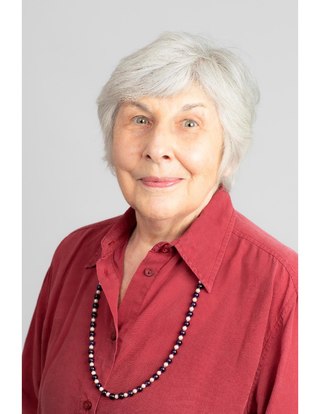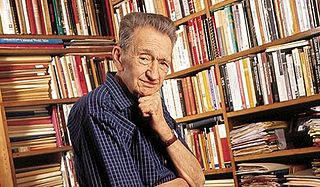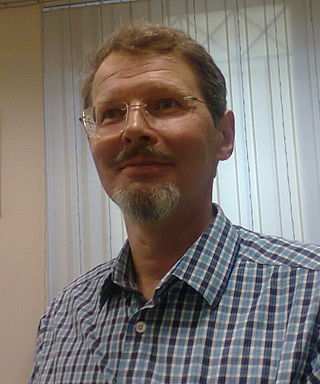Totalitarianism is a form of government and a political system that prohibits all opposition parties, outlaws individual and group opposition to the state and its claims, and exercises an extremely high if not complete degree of control and regulation over public and private life. It is regarded as the most extreme and complete form of authoritarianism. In totalitarian states, political power is often held by autocrats, such as dictators or absolute monarchs, who employ all-encompassing campaigns in which propaganda is broadcast by state-controlled mass media in order to control the citizenry.
Soviet and communist studies, or Soviet studies is the field of historical studies of the Soviet Union and other Communist states as well as historical studies of the Communist parties that existed or still exist in some form in many countries, both inside and outside the former Eastern Bloc, such as the Communist Party USA. Aspects of its historiography have attracted debates between historians on topics including totalitarianism and Cold War espionage.
Communism is a left-wing to far-left sociopolitical, philosophical, and economic ideology within the socialist movement, whose goal is the creation of a communist society, a socioeconomic order centered around common ownership of the means of production, distribution, and exchange that allocates products to everyone in the society based on need. A communist society would entail the absence of private property and social classes, and ultimately money and the state.

Sheila Mary Fitzpatrick is an Australian historian, whose main subjects are history of the Soviet Union and history of modern Russia, especially the Stalin era and the Great Purges, of which she proposes a "history from below", and is part of the "revisionist school" of Communist historiography. She has also critically reviewed the concept of totalitarianism and highlighted the differences between Nazi Germany and the Soviet Union in debates about comparison of Nazism and Stalinism.
Post-Soviet studies, also known as post-Soviet area studies or Former Soviet Union (FSU) studies, is a field of study within sociology and political science that emerged out of Soviet studies and Sovietology following the dissolution of the Soviet Union. The field encompasses a broad range of studies in the area of the former Soviet Union, including within Slavic studies and Central Eurasian studies, and the study of specific post-Soviet states, including: Armenianology, Baltic studies, Belarusian studies, Central Asian studies, Georgian studies, Russian studies, Ukrainian studies, and others.
The Holocaust in the Soviet Union was the Nazi German and Romanian persecution of Jews, Roma and homosexuals as part of the Holocaust in World War II. It may also refer to the Holocaust in the Baltic states, annexed by the Soviet Union before the start of Operation Barbarossa.

Michael (Michel) Confino (1926–2010) was a historian of 18th and 19th century Russia.
Daniel Beer is a British historian and Professor of Modern History at Royal Holloway, University of London. His book, The House of the Dead, won the 2017 Cundill History Prize and was shortlisted for the Wolfson History Prize.
Alexander S. Vucinich was an American historian. He taught at the department of history and sociology of science at the University of Pennsylvania from 1976 until his retirement in 1985. He also taught at San Jose State College (1950–64), the University of Illinois (1964–70), and the University of Texas (1970–76). After his retirement he and his wife Dorothy moved to Berkeley, California, where he participated in the activities of Berkeley's Institute of Slavic, East European, and Eurasian Studies. His field of research was the history of science and social thought in Russia and the Soviet Union.
The Manege Affair was an episode when Nikita Khrushchev together with other Party leadership visited an anniversary art exhibition "30 Years of the Moscow Artists' Union" at Moscow Manege on December 1, 1962. It resulted in Khruschev's angry rant against "filth, decadence and sexual deviations" he saw along with the traditional works of Socialist Realism. After the visit, he arranged a campaign to tighten the grip of the Party over culture. This has been described as the beginning of the end of the Cultural Thaw in the Soviet Union. The episode is covered in detail in the book Unofficial Art in the Soviet Union by Paul Sjeklocha and Igor Mead and in other publications.
This is a select bibliography of post World War II English language books and journal articles about the Revolutionary and Civil War era of Russian (Soviet) history. The sections "General Surveys" and "Biographies" contain books; other sections contain both books and journal articles. Book entries may have references to reviews published in English language academic journals or major newspapers when these could be considered helpful. Additional bibliographies can be found in many of the book-length works listed below; see Further Reading for several book and chapter length bibliographies. The External Links section contains entries for publicly available select bibliographies from universities.
This is a select bibliography of post World War II English language books and journal articles about Stalinism and the Stalinist era of Soviet history. Book entries have references to journal reviews about them when helpful and available. Additional bibliographies can be found in many of the book-length works listed below.
This is a select bibliography of English language books and journal articles about the post-Stalinist era of Soviet history. A brief selection of English translations of primary sources is included. The sections "General Surveys" and "Biographies" contain books; other sections contain both books and journal articles. Book entries have references to journal articles and reviews about them when helpful. Additional bibliographies can be found in many of the book-length works listed below; see Further Reading for several book and chapter-length bibliographies. The External Links section contains entries for publicly available select bibliographies from universities.

Below is a list of post World War II scholarly books and journal articles written in or translated into English about communism. Items on this list should be considered a non-exhaustive list of reliable sources related to the theory and practice of communism in its different forms.
This is a select bibliography of English language books and journal articles about the Soviet Union during the Second World War, the period leading up to the war, and the immediate aftermath. For works on Stalinism and the history of the Soviet Union during the Stalin era, please see Bibliography of Stalinism and the Soviet Union. Book entries may have references to reviews published in English language academic journals or major newspapers when these could be considered helpful.
Amir Weiner is an American historian and associate professor of Soviet history at Stanford University. His interests include mass violence, population politics, totalitarianism, and World War II. Weiner is the director of Center for Russian, East European and Eurasian Studies, and his research includes the KGB and the Soviet Union's surveillance state. Weiner is a former research scholar for the Wilson Center, and he was affiliated with the Kennan Institute in 1994–1995.

Oleksiy Petrovych Tolochko is a Ukrainian historian and medievalist, doctor of historical studies, and corresponding member of the National Academy of Sciences of Ukraine. Tolochko is the director of the Centre of Kievan Rus' Studies in Kyiv, and is known for his work on textual criticism of the Primary Chronicle.
Donald "Don" Gary Ostrowski is an American historian, and a lecturer in history at Harvard Extension School. He specialises in the political and social history Kievan Rus' and Muscovy.



